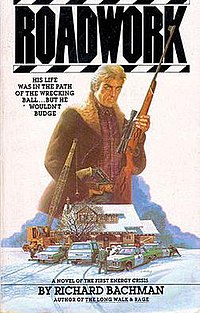Roadwork
by Stephen King
During a man-on-the-street news interview in August 1972, an unnamed man (later identified as Barton George Dawes) gives his angry opinion of a new highway extension project. The narrative then jumps forward to November 1973, with Dawes, seemingly unaware of the underlying motivations of his actions, visiting a gun shop and purchasing two high-powered firearms: a .44 Magnum revolver and a hunting rifle chambered for .460 Weatherby Magnum cartridges. The story gradually reveals that Dawes' son Charlie had died of brain cancer three years earlier, and that Dawes is unable or unwilling to sever his emotional ties to both the industrial laundry where he works and the house in which Charlie grew up. The laundry and his entire neighborhood are to be demolished as part of the project.
Dawes resigns his middle management job at the laundry after sabotaging the purchase of its new facility, and his wife Mary leaves him once she learns of both these actions and his failure to find a new house for the couple. Dawes then approaches Salvatore "Sal" Magliore, the owner of a local used-car dealership with ties to organized crime, in an attempt to obtain explosives. Magliore initially dismisses him as a crackpot, so Dawes assembles a load of Molotov cocktails and uses them to damage the highway construction equipment. He is not caught, but his actions cause only a brief delay in the project. Dawes initially refuses to accept the money being offered by the city for the house under the eminent domain statute, but changes his mind after the city's attorney threatens to publicize his brief tryst with Olivia Brenner, a young hitchhiker who had previously taken shelter at the house. Magliore has Dawes' house checked for listening devices planted by the city and later agrees to sell him a load of explosives. Dawes gives half the money from the house sale to Mary, gives $5,000 to a homeless man in a coffee shop, and has Magliore invest most of the remainder on behalf of Olivia after paying for the explosives.
In January 1974, with only hours remaining before he is required to leave the property, Dawes wires the whole house with the explosives and barricades himself inside. When the police arrive to forcibly evict him, he shoots at them, killing no one but forcing them to take cover and attracting the attention of the media. Dawes coerces the police into letting a reporter - the same one who interviewed him in 1972, though neither recognizes the other - enter and speak to him. Once the reporter has left, Dawes tosses his guns out the window and sets off his explosives, destroying the house and killing himself.
A short epilogue reveals that the reporter and his team ultimately won a Pulitzer Prize for their coverage of the incident and uncovered the truth about the extension project: there was no real reason for it. Unless the city built a certain number of miles of road per year, it would become ineligible for federal funding of interstate construction projects. The city quietly began preparing to sue Mary for her share of the eminent domain payout, but dropped the suit in the wake of public outcry.
